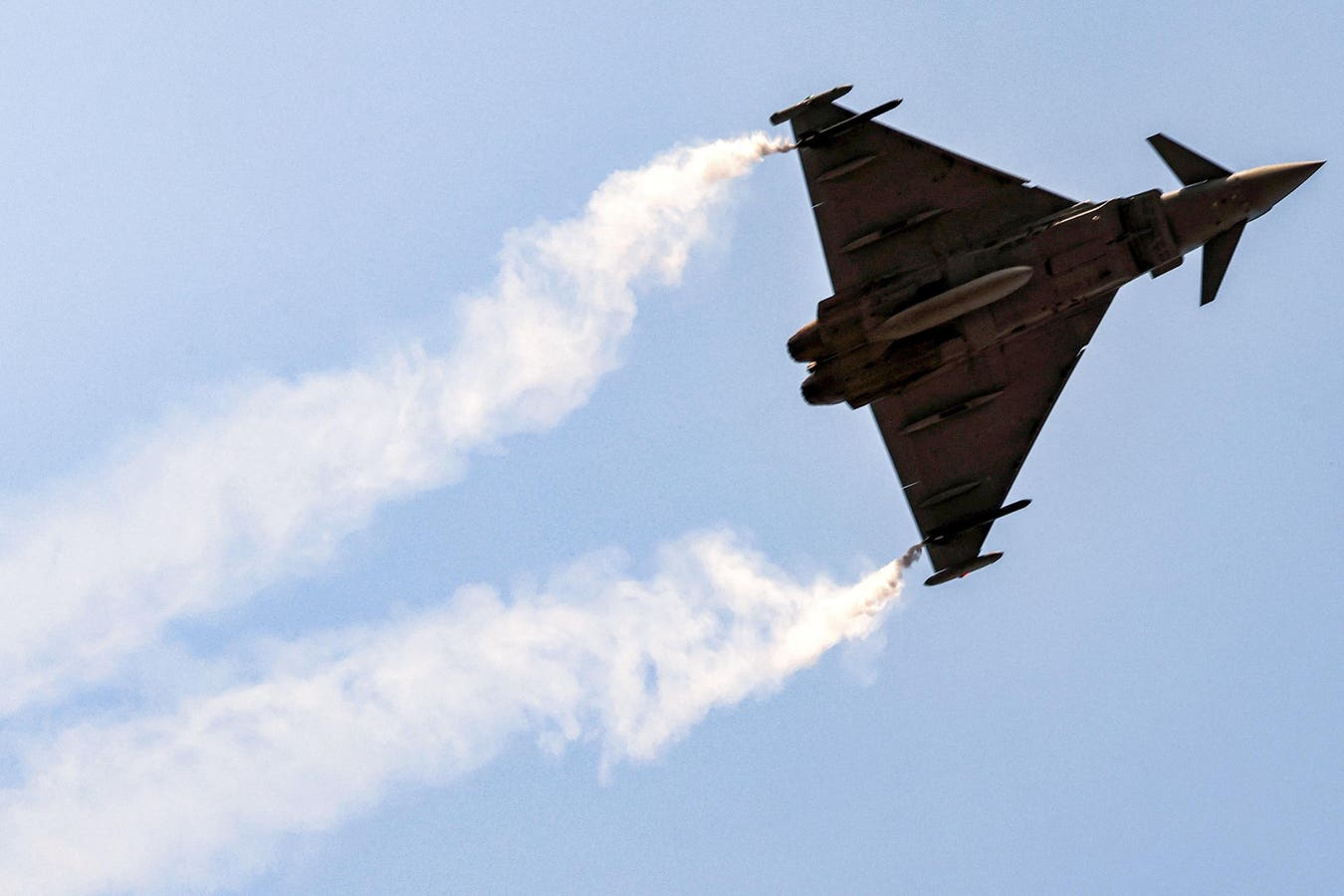Germany is reportedly reconsidering its five-year ban on selling additional Eurofighter Typhoon fighter jets to Saudi Arabia amid the rapidly shifting circumstances in the region. If Berlin does ultimately reverse its ban and authorizes sales to other Middle Eastern countries, the Eurofighter could give France’s Dassault Rafale much-needed competition in that region’s lucrative arms market.
The Israel-Hamas War has sparked renewed debate in Germany over the policy of blocking Britain’s sale of 48 jets to Riyadh, according to a report in the Financial Times.
Germany, Britain, Italy, and Spain jointly developed the Eurofighter. Therefore, any one of these countries can block any foreign sale of the fighter aircraft. Berlin blocked the Saudi sale in 2018, objecting to Saudi Arabia’s campaign in Yemen and the murder of journalist Jamal Khashoggi that year.
Britain previously sold Saudi Arabia 72 Eurofighters in 2007 and has been eager to sell the 48 more Germany has continuously blocked. With Riyadh reportedly contemplating a deal for 52 French Dassault Rafales, which would mark the first time the kingdom bought French jets, London is likely more eager than ever to have the Eurofighter deal unblocked as soon as possible.
After all, losing out to its French competitor is not the only thing on the line for Britain. An estimated 5,000 jobs at BAE factories in Britain and 15,000 more across the country rely upon producing Typhoons.
German opposition is also holding up another potential sale of Eurofighters to the region. Turkey is again floating the idea of buying 40 Eurofighters from Britain and Spain — which expect Germany to block any deal. A Eurofighter sale to Turkey would be significant since Turkey’s fighter fleet has been overwhelmingly American, with the third-largest fleet of F-16s worldwide.
Turkish President Recep Tayyip Erdogan has again insisted Turkey has several alternative sources for fighters if the proposed Eurofighter sale is blocked. However, analysts have maintained Turkey is unlikely to turn to France for Rafales.
Nevertheless, the Rafale has become the preeminent European fighter in the Middle East market, leaving the Eurofighter in the dust and giving the United States some significant competition.
After the United Arab Emirates objected to “onerous” preconditions the U.S. was imposing on a landmark deal for 50 fifth-generation F-35 Lightning II stealth jets, the wealthy Gulf country immediately turned to France in December 2021 for a record-breaking $19 billion deal for 80 Rafales.
While Abu Dhabi previously bought French jets and was never a customer for the Eurofighter, the deal nevertheless cemented France’s rapidly growing role as a major fighter supplier, second only to the United States in the region.
Britain had a similar role in the past, as exemplified by that sale of 72 Eurofighters to Saudi Arabia. If France successfully exploits Germany’s blocking of Eurofighters to sell Riyadh 52 Rafales, that would unequivocally demonstrate Paris’ market dominance.
Qatar has spent billions on building up its air force with Western 4.5-generation fighters in recent years. It bought advanced F-15QA (Qatar Advanced) fighters from the United States, Eurofighters from Britain, and Rafales.
However, the Rafale may eclipse the Eurofighter in this market. Doha ordered 24 Eurofighters in 2017. On the other hand, it has bought 36 Rafales and is presently considering buying another 24, which would give the tiny peninsular state 60 of the premier French fighter altogether!
The FT report noted that if Berlin does accede to Britain’s sale of Eurofighters to Saudi Arabia, it could indirectly irk Turkey.
“Making the case that Riyadh is a more sound regional partner than Ankara and deserving of a big arms deal risks aggravating tense relations with Turkey,” read the report.
Germany may find itself compelled also to loosen any restrictions on a Turkish deal. Berlin may find it easier to sell that to opposition parties and the public if the aircraft are earlier Tranche 1 models, which have limited air-to-ground capabilities and could thus be characterized as a more defensive aircraft.
Approving these sales to Riyadh and Ankara could see the consortium export around 88 fighters to the region, perhaps both newly-built and secondhand aircraft they wanted to dispose of anyway, especially those Tranche 1s.
Furthermore, with Germany’s approval, the Eurofighter could give France some competition in Egypt, the first country to buy the Mirage 2000 in 1981, and the Rafale in 2015.
Cairo never bought the Eurofighter, but it has reportedly considered a deal for 24 Typhoons for Italy for $3 billion, although the current status of that proposed sale is presently unclear. (Italy previously reached a deal in 2016 to sell Kuwait 28 Eurofighters.) Germany sells significant quantities of weaponry to Egypt, so it may not strenuously object to nor block any Eurofighter sale to Cairo from Rome.
Even a sale of two dozen Eurofighters wouldn’t seriously challenge France’s fighter sales to the North African country. Egypt already ordered 24 Rafales in 2015 and another 30 in 2021, the latter deal valued at $4.5 billion, bringing the total number to 54.
Still, Berlin’s approval of more Eurofighter sales to the Middle East would at least ensure France’s stupendous Rafale sales don’t completely dominate the non-American regional export market for fighter jets — a market that is currently booming.
Read the full article here





